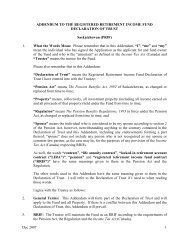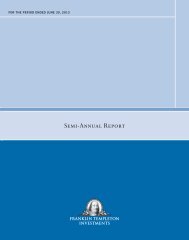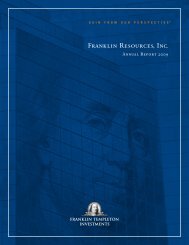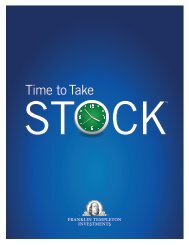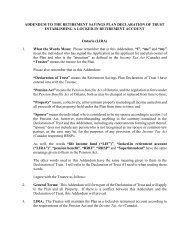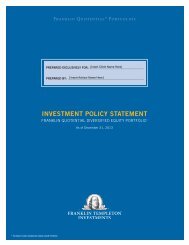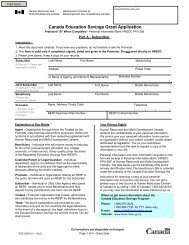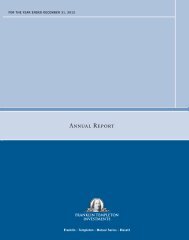ANNUAL REPORT - Franklin Templeton Investments
ANNUAL REPORT - Franklin Templeton Investments
ANNUAL REPORT - Franklin Templeton Investments
You also want an ePaper? Increase the reach of your titles
YUMPU automatically turns print PDFs into web optimized ePapers that Google loves.
<strong>Templeton</strong> Growth Fund, Ltd.<br />
MESSAGE TO SHAREHOLDERS<br />
Dear Shareholder,<br />
For the fiscal year in review the Fund delivered solid double-digit absolute returns on the back of strong stock selection<br />
across numerous regions and sectors. In our opinion, the positive impact of stock selection, as opposed to allocations or<br />
weightings, on performance highlights the advantages of our bottom-up, value-oriented investment process. While isolated<br />
stock-level weakness in a handful of sectors offset some of the relative gains found elsewhere, the overall trend during the<br />
period was one of value recognition as some of our longest-held convictions captured the bulk of relative outperformance.<br />
This was particularly notable in light of a challenging market environment. While conditions appeared to improve as the<br />
period progressed, the market still exhibited characteristics adverse to our style of investment. For example, investors preferred<br />
the perceived safety of bonds to equities during the review period, and stock market correlations—the degree to which<br />
stocks move in unison—reached record highs as equities were viewed less for their fundamentals and more as proxies for<br />
overall risk appetite.<br />
Risk appetite continued to fluctuate broadly as investor focus swung between optimism from aggressive central bank stimulus<br />
and corporate earnings strength on the one hand, and skepticism stemming from anemic economic growth, political<br />
dysfunction and fiscal imbalances on the other. Stocks entered the annual period on a weak note as a political backlash<br />
against austerity shook confidence in European stability. However, European Central Bank President Mario Draghi’s promise<br />
to do “whatever it takes” to preserve the euro restored order over the summer of 2012. Equities experienced another bout of<br />
weakness in the fall of 2012 as Hurricane Sandy ravaged the US east coast and countries representing over 50% of global<br />
gross domestic product (GDP)—including the United States, China and Japan—all underwent political election or transition<br />
cycles. Ultimately, central bank vigilance and continued corporate earnings strength combined to sustain the global equity<br />
rally through the winter and spring of 2013.<br />
The main feature of the stock market rally in these final months was its growing defensiveness. Counter-cyclical sectors like<br />
Health Care, Utilities and Consumer Staples attracted the lion’s share of investor attention. However, we view the outperformance<br />
of some our highest conviction holdings, in a market still largely in the thrall of macroeconomic trends, as an<br />
encouraging sign. In short, if our “bottom-up” investment theses can gain traction in a market still dominated by “top-down”<br />
macroeconomic forces, we remain optimistic about the portfolio’s long-term potential once the market eventually reverts<br />
back to its traditional role as value arbiter.<br />
Our investment theses that have begun to materialize span both cyclical and defensive sectors. Consumer Discretionary and<br />
Information Technology stocks led Fund returns: while these traditionally cyclical sectors were the Fund’s biggest relative<br />
overweights during the period, outperformance had little to do with allocation. Stock selection, in fact, was the performance<br />
driver. Our long-held belief that select US media companies—including cable operators like Comcast Corp. and production<br />
studios like News Corp.—would benefit from the growing demand for premium content and high-capacity broadband access<br />
came to fruition as these companies exceeded earnings expectations and rose to record levels. In Information Technology,<br />
our belief that corporate customers in uncertain times would prioritize productivity—enhancing expenditures over capacityenhancing<br />
spending also materialized, much to the benefit of firms like Accenture PLC and SAP AG. We also reaped the<br />
benefits of our contrarian Health Care sector holdings during the fiscal year and continue to diversify into undervalued biotechnology,<br />
specialty pharmaceutical and medical technology firms with attractive growth prospects.<br />
In contrast, isolated weakness among overweighted Energy holdings and even-weighted Financials and Industrials stocks<br />
detracted. Here too, we maintain a high degree of confidence in our convictions. Our integrated oil holdings are in companies<br />
positioned for above-average production growth, while our oilfield services holdings should benefit from rising demand<br />
for technical expertise in extracting hydrocarbons from challenging locations. In Financials, we expect our banks and<br />
insurers to benefit as aggressive restructuring and fundamental repair restore normalized levels of profitability to the industry.<br />
Finally, our Industrials positions offer cyclical leverage and yield opportunity at significantly more attractive valuations than<br />
those found in other economically-sensitive sectors, like Materials.<br />
2 <strong>Templeton</strong> Growth Fund, Ltd.



